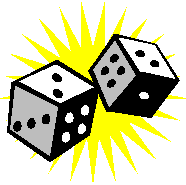 Are shares prices random?
Are shares prices random?
|
One test of randomness is the runs test (Bradley, (1968). Distribution-Free Statistical Tests, Chapter 12). A run is defined as a series of increasing values or a series of decreasing values. The number of increasing, or decreasing, values is the length of the run. I have calculated the mean for the differences in share or index prices given below, and then grouped the results into 2 sets N1 and N2 according to whether they were above or below the mean. I then performed the Wald-Wolfowitz runs test. Each run is a sequence of either N1 or N2.
|
| Share/Index | Dates | Interval | Runs | N1 | N2 | Expected Number of Runs |
sd | z-value | approx probability% |
z-val (continuity correct) |
p% |
| OEX | 28/8/02 to 2/8/82 |
1 day | 2580 | 2530 | 2535 | 2533.5 | 35.58 | 1.307 | 90 | 1.32 | 90 |
| OEX | 28/8/02 to 2/8/82 |
20 days | 131 | 124 | 126 | 126 | 7.8 | .63 | 73 | .69 | 75 |
| OEX | 28/8/02 to 2/8/82 |
200 days | 12 | 10 | 12 | 11.9 | 2.26 | .04 | 51 | .26 | 60 |
| DJIA | 02/1/53 to 13/12/91 | yearly | 20 | 20 | 16 | 18.8 | 2.9 | .41 | 66 | .58 | 72 |
| tmpw | 16/12/96 to 8/10/02 |
1 day | 716 | 793 | 659 | 720.8 | 18.88 | -.25 | 40 | -.228 | 40 |
| aapl | 9/9/84 to 8/10/02 |
1 day | 2258 | 2430 | 2131 | 2271 | 33.6 | -.4 | 34 | -.39 | 34 |
Conclusion: we can say with greater than 99% certainty that both the shares and indexes considered in these times periods were random.